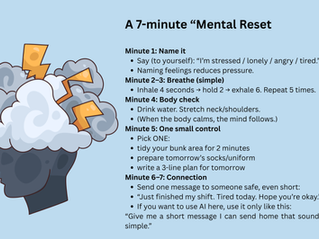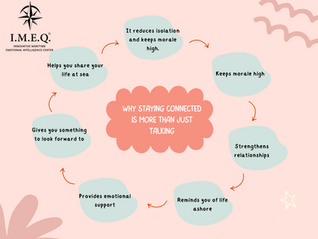Addressing Bullying Among Seafarers: Practical Tips and Creative Solutions
- Jul 27, 2024
- 4 min read

Bullying among seafarers is a serious issue that can severely impact the mental health and overall well-being of those involved. The unique environment onboard a vessel, with close quarters and extended periods away from home, can exacerbate these issues. This article aims to help seafarers identify bullying by peers, understand their rights, and offer practical tips and creative solutions, especially for those who are introverted, shy, or face language barriers.
Understanding and Identifying Bullying
Bullying is a repeated, intentional act that aims to hurt, intimidate, or dominate another person. It can take various forms, and recognizing these signs is the first step in addressing the issue.
Signs of Bullying:
Physical Bullying: Hitting, pushing, or other forms of physical aggression.
Verbal Bullying: Insults, threats, or derogatory remarks.
Psychological Bullying: Intimidation, excessive criticism, or undermining your work.
Exclusion: Being intentionally left out of work-related activities or social gatherings.
Cyberbullying: Hurtful messages or social media posts.
Practical Tips for Seafarers
1. Document Everything: Keeping a detailed record of all incidents of bullying is crucial. Note the dates, times, what was said or done, and any witnesses. This documentation can be vital if you need to report the behavior.
2. Know Your Rights: Familiarize yourself with your company’s policies on bullying and harassment. Understanding these policies can help you know what steps to take and what protections you have.
3. Seek Support:
Speak to a Trusted Colleague: Find someone you trust onboard and share your experiences. They may offer support or help you address the issue.
Contact a Union Representative: If you are part of a union, they can provide advice and support in dealing with bullying.
4. Confront the Bully (If Safe):
Stay Calm: Approach the situation calmly and professionally.
Use “I” Statements: Focus on how the behavior affects you. For example, “I feel upset when you criticize my work in front of others.”
Be Specific: Mention specific incidents and behaviors that you find unacceptable.
5. Use Available Resources:
Onboard Counselor: Some vessels have access to counselors or helplines that can offer confidential advice.
Company Hotline: Many companies provide hotlines for reporting bullying and harassment.
Creative Solutions for Introverted and Shy Seafarers
1. Write It Down: If speaking up is difficult, consider writing a letter or email to the individual involved or to HR detailing your experiences and concerns.
2. Use Technology:
Translation Apps: If language is a barrier, use translation apps to help communicate your issues clearly.
Record Incidents: With permission, record situations where bullying occurs. This provides clear evidence and helps in articulating your experiences later.
3. Form a Support Network: Connect with other crew members who might be facing similar issues. There is strength in numbers, and having a support network can help you feel less isolated.
4. Practice Assertiveness:
Role-Playing: Practice what you want to say with a trusted friend or colleague.
Assertiveness Training: Look for resources or online courses that can help you develop assertiveness skills.
5. Engage in Team Activities: Participate in onboard social activities to build relationships with your peers. This can help you gain allies and make it easier to address bullying as a group rather than alone.
Practical Steps to Take If You Are Being Bullied
1. Seek Mediation: Request a mediation session with a neutral third party, such as an HR representative or a senior officer, to address the issue in a controlled environment.
2. File a Formal Complaint: If informal approaches do not work, file a formal complaint through the appropriate channels within your company. Provide your documentation as evidence.
3. Know the Reporting Procedures: Understand the formal procedures for reporting bullying. This might include speaking to the ship's master, using anonymous reporting systems, or contacting your company's HR department.
4. Take Care of Your Mental Health:
Mindfulness and Stress Relief: Practice mindfulness techniques and stress-relief exercises to maintain your mental well-being.
Professional Help: Seek professional help if needed. Many organizations offer confidential counseling services.
5. Stay Informed: Stay informed about your rights and the resources available to you. Many maritime organizations provide support and resources for dealing with bullying.
Creative Solutions for Language Barriers
1. Use Visual Communication:
Charts and Diagrams: Use visual aids to communicate your points if language is a barrier.
Body Language: Be mindful of your body language and use it to reinforce your message.
2. Learn Basic Phrases:
Language Learning Apps: Use apps to learn basic phrases in the primary language spoken onboard.
Cultural Sensitivity: Show respect for different cultures and languages, which can help in building rapport.
3. Buddy System: Pair up with a colleague who speaks both your language and the primary language onboard. They can help translate and mediate conversations.
Conclusion
Bullying among seafarers is a serious issue that can affect your mental health and job performance. It is important to recognize the signs of bullying, document incidents, and seek support. For seafarers who are introverted, shy, or face language barriers, creative solutions like using technology, forming support networks, and practicing assertiveness can make a significant difference. Remember, no one should have to endure bullying, and there are resources and strategies available to help you address and overcome it. Stay strong, seek support, and take action to create a safer and more respectful working environment.





































































































I was diagnosed with Parkinson’s disease four years ago. For over two years, I relied on Levodopa and several other medications, but unfortunately, the symptoms kept getting worse. The tremors became more noticeable, and my balance and mobility started to decline quickly. Last year, out of desperation and hope, I decided to try a herbal treatment program from NaturePath Herbal Clinic.Honestly, I was skeptical at first, but within a few months of starting the treatment, I began to notice real changes. My movements became smoother, the tremors subsided, and I felt steadier on my feet. Incredibly, I also regained much of my energy and confidence. It’s been a life-changing experience I feel more like myself again, better than I’ve felt…
Participate in onboard social activities